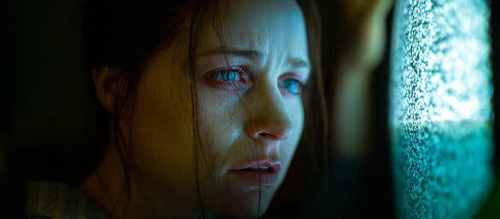Censor (2021) Review
Censor (2021)
Director: Prano Bailey-Bond
Screenwriter: Prano Bailey-Bond, Anthony Fletcher
Starring: Niamh Algar, Sophia La Porta, Michael Smiley
The moral panic caused by the video nasties throughout the 1980s is a fascinating topic that has remained a subject of much research and fascination for horror and film buffs alike, right through to the modern day. Censor (2021) is the latest of many films that have since been made in an attempt to pay tribute to several films featured on the infamous Director of Public Prosecutions’ list of video nasties (also known as the DPP list), though there has never been a film that delves into the actual process of the British Board of Film Censors’ censorship of said video nasties until now.
Censor follows Enid (Niamh Algar – Calm with Horses), a British film censor who links a disturbing horror movie to her sister’s mysterious disappearance. The film takes influence from the very video nasties featured within it, but there is a lot more at work within Censor than the meaningless blood and gore that is associated with movies of this particular movement. This 2021 release is set during the peak of the DPP list – a time in which the government would heavily restrict or ban film releases in order to reinforce its ideology that art was to blame for rising levels of violence and crime, instead of governmental policies – and dives deep into ideas of self-censorship and placing trauma within art.
Despite it being her feature film debut, Welsh director and co-writer Prano Bailey-Bond directs the film with maturity, effectively using her crew to create a magnificent world for each of us to get sucked into – who doesn’t want to live in a world in which a movie called Rat Brothel exists?
Perhaps the strongest element of Censor is how it presents itself as a horror. The story plays out more as a thriller, verging on psychedelic at points, with very little gore, yet the tone and the world the characters live within feels exclusive to the horror genre. There is a particularly effective use of the censorship office as a backdrop to the whole piece, and eerie soundscapes created within it that add elements of fear and dread to every second of the film’s runtime. The entire movie feels as though the walls are dripping with blood, even when there is not a drop of red in sight.
Most impressive for a debut filmmaker, however, is Bailey-Bond’s ability to juggle a layered thematic presentation, audience expectations regarding the content of her piece, and the real-life history of the DPP’s restrictive and authoritarian approach to film censorship. With so much going on, ideas can quickly become intertwined, with the video nasties and the real world becoming blurred by what is effectively white noise – and Censor is likely to become polarising because of how it presents that which it wishes to tackle – but despite being at times tough to follow and at others challenging, once everything is wrapped up with a fantastic ending, this is a British film that is likely to stick with you for a long time; a thrilling and rewatchable film in its own right.
Writing a truly captivating and original story all the while creating a fascinating world filled to the brim with references to the very films she celebrates, the debuting Bailey-Bond has created a well made albeit imperfect horror that should be seen by fans of horror and British film alike. With Censor, Prano Bailey-Bond has proven herself to be a director to watch.
17/24


